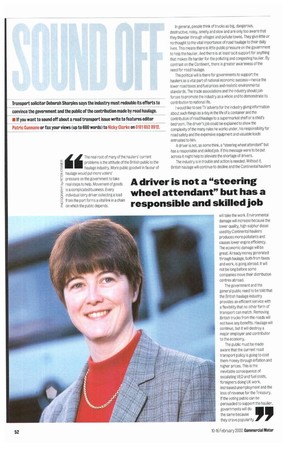Transport solicitor Deborah Sharpies says the industry must redouble its
Page 54

If you've noticed an error in this article please click here to report it so we can fix it.
effortsto convince the government and the public of the contribution made by road haulage.
• If you want to sound off about a road transport issue write to features editor Patric Cunnane or fax your views (up to 600 words) to Nicky Clarke on 1181 652 8912.
The real root of many of the hauliers' current problems is the altitude of the British public to the haulage industry. More public goodwill in favour of FE haulage would put more voters' ▪ pressure on the government to take -='? real steps to help. Movement of goods ▪ is a complicated business. Every cc individual lorry driver collecting a load Pfrom the port forms a vital link in a chain on which the public depends. In general, people think of trucks as big, dangerous, destructive, noisy, smelly and slow and are only too aware that they thunder through villages and pollute towns. They give little or no thought to the vital importance of road haulage to their daily lives. This means there is little public pressure on the government to help the haulier. And there is at least tacit support for anything that makes life harder for the polluting and congesting haulier. By contrast on the Continent, there is greater awareness of the need for road haulage.
The political will is there for governments to support the hauliers as a vital part of national economic success—hence the lower road taxes and fuel prices and reabstic environmental standards. The trade associations and the industry should join forces to promote the industry as a whole and to demonstrate its contribution to national life.
I would like to see TV adverts for the industry giving information about such things as a day in the life of a container and the contribution of road haulage to a supermarket shelf or a child's bedroom. The driver's job could be explained to show the complexity of the many rules he works under, his responsibility for road safety and the expensive equipment and valuable loads entrusted to him.
A driver is not, as some think, a "steering wheel attendant" but has a responsible and skilled job. If this message were to be put across it might help to alleviate the shortage of drivers.
The industry is in trouble and action is needed. Without it, British haulage will continue to decline and the Continental hauliers will take the work. Environmental damage will increase because the lower quality, high-sulphur diesel used by Continental hauliers produces more pollutants and causes lower engine efficiency. The economic damage will be great. Already money generated through haulage, both from taxes and work, is going abroad. It will not be long before some companies move their distribution centres abroad.
The government and the general public need to be told that the British haulage industry provides an efficient service with a flexibility that no other form of transport can match. Removing British trucks from the roads will not have any benefits. Haulage will continue, but it will destroy a major employer and contributor to the economy.
The public must be made aware that the current road transport policy is going to cost them money through inflation and higher prices. This is the inevitable consequence of escalating VED and fuel costs, foreigners doing UK work, increased unemployment and the loss of revenue for the Treasury. If the voting public can be persuaded to support the haulier, governments will do the same because they crave popularity.












































































































